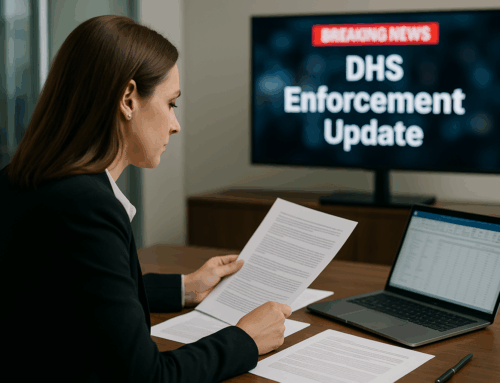The National Interest Waiver (NIW) is a special category under U.S. immigration law that provides an alternative pathway for foreign nationals to obtain lawful permanent residence (green card) without requiring the standard employer-sponsored labor certification (PERM) process. This waiver, designed for certain categories of employment-based immigrants, enables those whose work serves a substantial benefit to the U.S. to bypass some of the more labor-intensive requirements of immigration processing.
PERM and the Labor Certification Process
- Typically, employer-sponsored immigrants seeking lawful permanent residence in the U.S. must go through the Department of Labor (DOL) labor certification process, or PERM, as described in section 212(a)(5)(A) of the Immigration and Nationality Act (INA). PERM certifies that:
- There are insufficient qualified U.S. workers to fill the role, and
- The employment of the foreign national will not adversely affect the wages and working conditions of similarly employed U.S. workers.
This requirement exists to protect the U.S. labor market. PERM labor certification is time-intensive, often requiring over a year in pre-filing steps, plus an additional year or more to receive an adjudication response from the DOL after filing. The NIW, however, allows certain highly qualified professionals whose work benefits the national interest to bypass this requirement.
Legislative Background and Evolution of the NI
Since its establishment, the NIW has evolved through administrative law to reflect changing national priorities. Below is a brief history of significant changes to the NIW framework:
1. 1992: Mississippi Phosphate Decision
In the 1992 Mississippi Phosphate1364-65 (Oct. 26, 1992) decision, seven factors were identified for determining eligibility for the NIW. Applicants were required to show that their work would improve one or more of the following:
- U.S. Economy
- Working Conditions for U.S. workers
- Education for U.S. Children
- Health Care
- Affordable Housing
- Environment and Natural Resources
- Or received support from an Interested Government Agency
These factors set the stage for evaluating whether a foreign national’s work justified a waiver of the labor certification process.
2. 1998: NYSDOT Standard
In 1998, the New York State Department of Transportation (NYSDOT) 22 I&N Dec. 215 (Acting AC 1998) case created a three-part test, adding more specificity to the NIW criteria:
- The employment must be in an area of substantial intrinsic merit.
- The work must benefit the U.S. on a national level.
- The national interest would be adversely affected if the foreign national had to go through the PERM labor certification.
This ruling clarified that an applicant’s work needed to have broad implications for the country rather than benefiting only a specific region.
3. 2016: Matter of Dhanasar Decision
The most recent landmark decision, Matter of Dhanasar (2016) 26 I&N Dec. 884. (AAO 2016) redefined the NIW criteria into a streamlined three-pronged approach:
1. Substantial Merit and National Importance: The applicant’s work must be of substantial merit and of national importance.
2. Position to Advance the Endeavor: The foreign national should be well-positioned to advance their work, demonstrating a proven track record or the potential for significant contributions.
3. Balancing Test: On balance, it should be beneficial for the U.S. to waive the labor certification requirement.
This decision marked a pivotal shift, making it more feasible for diverse professionals, particularly those in STEM, social sciences, health care, and similar fields, to qualify for the NIW.
Administrative Priorities and Future Evolution
The NIW pathway has continually adapted to reflect broader policy trends. Moving forward, it is expected that this trend will continue. Future administrations are likely to consider the U.S. labor market more closely, possibly resulting in stricter interpretations of the NIW criteria to encourage more immigrants to go through the PERM process. Both political parties have shown interest in reinforcing the U.S. labor force, which may lead to fewer NIW approvals and a potential increase in the complexity of the waiver criteria.
Current Realities of PERM and Visa Bulletin Wait Times
Today, the PERM process remains lengthy, with most applicants facing significant delays, sometimes exceeding two years from the beginning of the process to final adjudication. Compounding these delays, visa bulletin wait times for priority dates to become current are also increasing. This trend indicates that even if the NIW criteria were to tighten, the visa backlog might remain a hurdle. Getting a NIW approval can save the foreign national time by getting in the Visa Bulletin line sooner.
Conclusion
The National Interest Waiver represents a crucial mechanism for U.S. immigration policy, enabling the nation to attract talent that contributes significantly to its interests. While the current NIW standard remains relatively open; however this is subject to change in upcoming administrations. For individuals seeking to use their talents for the betterment of the U.S., the NIW offers an invaluable pathway—one that will likely continue to reflect the country’s changing priorities in the coming years.
Get In Touch

Robert G. Nadalin is certified by the State Bar of California Board of Legal Specialization as a Specialist in Immigration and Nationality Law. He received his J.D. from South Texas College of Law in 1998 and his B.A. in Japanese from Ohio State University in 1993. Robert has served in leadership roles with the American Immigration Lawyers Association (AILA), including San Diego Chapter President, National Board Member, and California Service Center Liaison Committee Member. He is a member of the State Bar of California and the State Bar of Texas.







